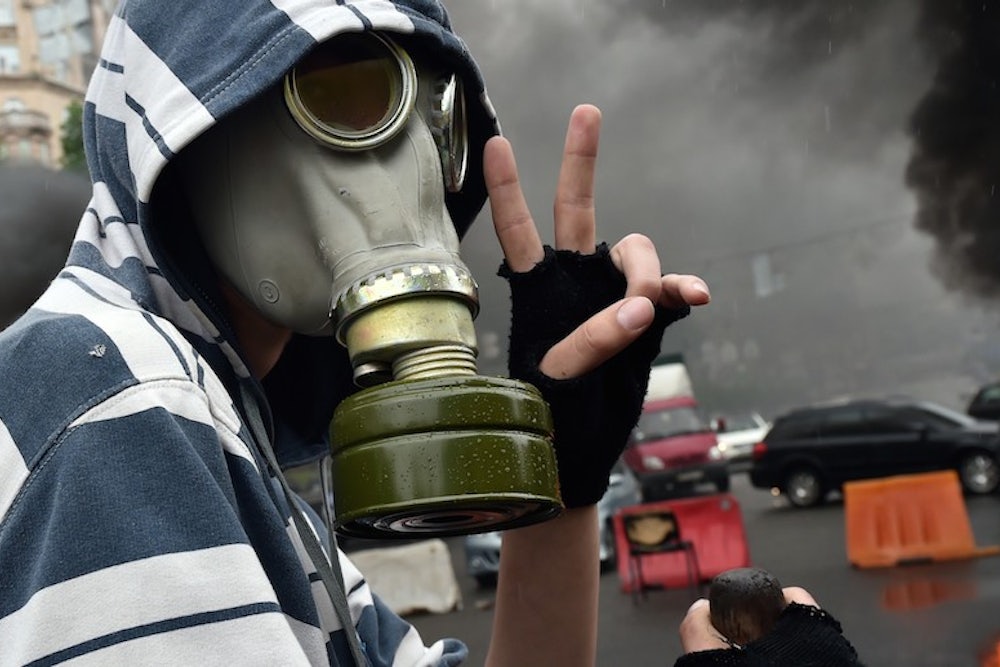KIEV—Maidan is not what it used to be. The talk in Kiev is that the square has become a darker, “different Maidan,” much different than the revolutionary, democratic collective that toppled former Ukrainian President Viktor Yanukovych three months ago. Now that Ukraine has elected a new government, Maidan occupants find themselves at odds with the new political leaders, who would like to evict them from the square so that life in Kiev can return to normal.
On Sunday, mayor-elect Vitali Klitschko announced on the Maidan stage that he had no intent to clear the square, despite having called for its occupants to go home just the week before. The crowd booed him anyway. Maidan's residents don’t trust the new government, and don’t yet recognize Klitschko as the mayor-elect. Ballots are still being counted, and there have been allegations of fraud in the mayoral polls. “Because the official election results have not been announced yet, he doesn't have the right to give directions,” Vitalik Vyrupayev, the leader of a group of Maidan fighters from Odessa, told me.
It’s undeniable that Maidan has changed over the past weeks—there are fewer people, fewer tents, and significantly less money to go around. Hundreds of self-defense forces have gone to fight in the east, and many of those who remain are readying to do the same. As the Wall Street Journal’s Paul Sonne reports, “Some Ukrainians now complain the square has become a stomping ground for panhandlers and drunks.” That perception was only bolstered by the image of self-defense forces burning tires to protest Klitschko’s suggestion that it might be time for them to pack up. Last week, a camera crew from Ukraine’s independent station Hromadske TV was assaulted by Maidan protesters angry at the government’s attempt to clear the square.
Gaide Rizaeva, a law clerk from Simferopol, has been living in the Maidan for months, helping to resettle the hundreds of Crimean refugees who have fled to Kiev. On Sunday, Rizaeva says, she was kidnapped from a nearby street and held captive until she agreed to take down the “Crimea” tent on the square in exchange for a large sum. “It was a political affair. Someone is interested in making sure that this mechanism doesn’t work—someone needs to make sure that the people who come from Crimea and from the east have to live in the streets,” she said. Rizaeva told her captors that she would take down the tent, but has no intention of doing so: “This tent will stand until Crimean becomes a part of Kiev.”
Those that have abandoned the square have varied motivations. Rizaeva said there are “people who are just tired, who took down their tents and went home, because six months of this is a serious matter. There are people who went to the hot spots in the east, and then there are people who sold out” —some were allegedly paid to take down their encampments.
But Maidan still stands, and like Rizaeva, its residents are determined to stay put until their demands are met. Many are afraid that if they clear out of the square, Ukraine will revert to the same opaque, paralyzing system of governance and all of their efforts will come to naught. After all, the same parliament that approved draconian anti-protest laws back in January is still in power; the ministers who made up former President Yanukovych’s cabinet have not been held accountable for mismanaging the country, nor has Yanukovych himself been punished for ordering the killing of his own people. And it’s difficult to see how the country will rid itself of its endemic corruption (though some have suggested that Ukraine could and should build its own version of the FBI). Even after the triumphant ouster of Yanukovych and this month’s successful presidential election, many on the Maidan are still waiting for more conclusive change.
“It’s like they are suffering from a feeling of anticlimax,” Shira Pinson, a British filmmaker who has spent the last month in Kiev told me. But reform takes time, and Maidan self-defense forces don’t seem to want to budge until reforms are completed. Klitschko’s administration needs a city hall where it can work, but Maidan troops who have been living there refuse to move out. On Tuesday afternoon, at least a hundred camouflaged fighters gathered for a rally on the city hall steps to send the message to Klitschko that they have no intention of leaving until they get what they want: permanent representation. “There has to be a Council of Maidan, a council of Ukraine, and all the laws to be passed by the Rada [the Ukrainian parliament], they have to be under the people’s control,” Vyrupayev said. “That way, in the event that we need to call a people’s assembly here, it will be possible to influence power in some way.”
They also want memorials built to the Heavenly Hundred, and to make sure that the government will provide basic social services to the families of those who are willing to die for Ukraine. “Every day, people go to Slavyansk, to Lugansk, to Donetsk. And we will go, of course. But we want to establish a social status for people who depart there. People have families. So that every fighter will be protected by the law of Ukraine,” Vyrupayev said. “We just don't want to be cannon fodder.”
